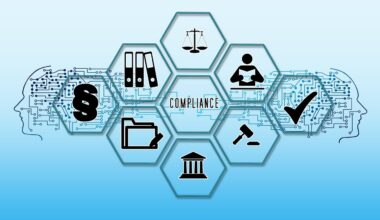Understanding Whistleblower Protections: An Overview for Financial Professionals
Whistleblower protections are essential tools within the financial sector, promoting transparency and integrity. These laws are designed to protect individuals who report unethical or illegal activities. Financial professionals often face difficult choices when they witness misconduct. Ensuring they have legal safeguards is crucial for encouraging reports of wrongdoing. Under various regulations, including the Dodd-Frank Act, whistleblowers can receive significant monetary rewards and protection against retaliation. This creates an environment that fosters ethical behavior and compliance within organizations. However, it’s vital for whistleblowers to understand the process for reporting and the potential consequences they may face. Risking one’s career for the greater good is not taken lightly. Thus, financial professionals must receive adequate training on how to identify issues that warrant reporting. Equally important is ensuring that companies implement policies that support these employees. By establishing secure channels for reporting and ensuring confidentiality, organizations can create a culture of integrity. Moreover, education and support networks are essential components of effective whistleblower policies, increasing the likelihood that misconduct will be reported and addressed.
The Importance of Whistleblower Protections
Whistleblower protections safeguard the interests of individuals who report misconduct in the financial arena. These protections are specifically vital in the heavily regulated financial services landscape. They ensure that employees can speak out without fear of retaliation, including job loss or harassment. By offering such protections, financial institutions can uphold ethical standards and comply with regulatory requirements. The benefits of whistleblower programs extend beyond legal compliance, fostering a culture of openness and accountability. Employees are more likely to voice concerns if they feel secure. Additionally, robust protections can help organizations avoid severe penalties by identifying and addressing issues proactively. Mitigating risks associated with fraud, accounting errors, and compliance violations can save companies significant amounts of money in fines. Furthermore, whistleblower programs encourage employees to actively participate in creating an ethical workplace culture. When employees understand the mechanisms in place to protect them, they are motivated to report unethical behavior. Thus, organizations benefit from a more transparent atmosphere, where employees feel valued and protected, ultimately reinforcing their commitment to ethical practices and compliance standards.
Legal Framework for Protections
The legal framework surrounding whistleblower protections is complex yet vital for professionals in the financial sector. Key legislation, such as the Dodd-Frank Act, outlines explicit protections for whistleblowers who report securities violations to regulatory authorities. Under this act, employees may receive financial rewards based on the penalties imposed on wrongdoers. Other essential laws include the Sarbanes-Oxley Act, which protects employees of publicly traded companies who report fraud. Understanding these laws is crucial for financial professionals to navigate potential legal recourse. It equips them to act judiciously when confronted with ethical dilemmas. Compliance with these laws not only protects whistleblowers but also enhances overall corporate governance. Moreover, various states have enacted additional laws to strengthen these protections further. For example, some states offer broader definitions of retaliation that can include adverse job actions. Thus, financial professionals must familiarize themselves with both federal and state regulations. Keeping up-to-date with evolving laws surrounding whistleblower protections further cultivates informed decision-making. Consequently, legal acumen regarding whistleblower rights is imperative for financial professionals committed to ethical standards.
Understanding the reporting process is crucial for enhancing whistleblower protections. Financial professionals must know how to properly report wrongdoing within their organizations. This typically starts by reporting the issue internally, which allows the organization to address the concern before escalating to external authorities. Establishing anonymous reporting channels is essential to encourage employees to come forward without fear. Companies should create specific procedures outlining how to report misconduct, what information is needed, and who to contact. Ensuring confidentiality throughout the process is vital to protect whistleblowers. Furthermore, organizations should train their employees on the reporting mechanisms and reassure them about their rights. It helps to instill a sense of safety and trust in the process. Additionally, creating a culture where reporting is viewed positively can encourage employees to speak up. By embedding ethical practices into the organizational culture, companies can come together to tackle misconduct effectively. Clear communication about the consequences of retaliation is crucial as well. Employees should feel assured that any reports of wrongdoings are taken seriously and that there will be no repercussions for coming forward.
Organizations that promote whistleblower protections experience numerous benefits, both operationally and culturally. One significant advantage is the ability to detect and resolve issues more efficiently. When employees feel safe to report misconduct, potential problems can be addressed before they escalate. It can prevent financial losses, reputational harm, and legal challenges that arise from unchecked wrongdoing. Whistleblower protections also enhance employee engagement and morale. When employees see that their concerns are taken seriously, they feel valued and heard. This, in turn, fosters a stronger organizational commitment towards ethical behavior and compliance. Furthermore, companies with effective whistleblower protections often enjoy improved public perception and trust. Stakeholders are increasingly concerned about ethical standards; therefore, demonstrating a commitment to integrity can attract more customers and investors. It reflects positively on brand reputation and can improve financial performance. Additionally, whistleblower protections contribute to fulfilling corporate social responsibility by showing that a company prioritizes ethics. In today’s competitive marketplace, being regarded as an ethical company can differentiate an organization from its competitors.
Challenges related to whistleblower protections persist, making it essential for financial professionals to proactively address them. One significant challenge is the fear of retaliation, which often discourages employees from reporting misconduct. Organizations must combat this fear by implementing robust protections and fostering a supportive environment. Additionally, many employees may lack awareness of their rights and the reporting process, hindering effective whistleblowing. Companies should prioritize educating their workforce about these protections and encouraging open discussions about ethics. Another challenge is ensuring confidentiality in the reporting process. If anonymity cannot be guaranteed, employees may hesitate to come forward. Organizations must implement secure systems that protect the identity of whistleblowers during investigations. Furthermore, some organizations may struggle with managing investigations related to whistleblower reports. Properly handling these inquiries is crucial for maintaining trust and compliance. Ensuring designated personnel are trained to manage these processes can enhance effectiveness and transparency. It’s vital to view whistleblower protections not just as a compliance issue, but as a comprehensive strategy to reinforce organizational integrity and ethical standards.
In conclusion, whistleblower protections play an irreplacable role within the financial sector. They empower professionals to report unethical or illegal activities without fear of repercussions. Understanding these protections is crucial for creating an ethical workplace culture. Training employees on their rights ensures they know how to report misconduct. Implementing effective policies fosters openness and accountability, leading to a healthier organizational climate. Moreover, organizations should actively promote these standards to enhance employee engagement and trust. Maintaining transparency in reporting processes, backing employees, and effectively managing investigations is crucial for success. Financial institutions face mounting public scrutiny; therefore, demonstrating a commitment to whistleblower protections will bolster trust among stakeholders. As regulations evolve, financial professionals must stay informed to ensure compliance and to uphold ethical practices. In doing so, they enhance their own reputations and that of their organizations. Ultimately, the success of whistleblower protections relies on collaboration between employees and employers. Together, they can create an environment where integrity flourishes, ensuring the financial sector remains accountable and transparent. This collective effort will contribute to upholding public trust in the financial system.
Final Thoughts on Enhancing Whistleblower Protections
Investment in whistleblower protections is essential for financial organizations seeking sustainable success. Recognizing the benefits of a transparent reporting culture allows businesses to thrive in an ethical framework. As more professionals understand their roles and responsibilities regarding compliance, the overall integrity of the financial sector will improve. Future efforts should focus on strengthening laws and reinforcing protections to further support whistleblowers. This collaborative approach should lead to continuous improvements in workplace ethics. Nevertheless, organizations must remain vigilant against potential retaliation. Regular assessments of whistleblower policies are necessary for understanding effectiveness and identifying areas for enhancement. Open dialogue and engagement within the workforce can aid in this endeavor. Companies must strive to create an environment where employees feel secure and empowered to voice their concerns. Encouraging feedback and providing consistent education on reporting misconduct is also instrumental to fostering a culture of accountability. Moreover, showcasing real cases where whistleblower reports have led to positive outcomes can inspire employees to act ethically. By investing resources in education, training, and supportive policies, financial professionals contribute to crafting a stronger, more ethical financial landscape.





